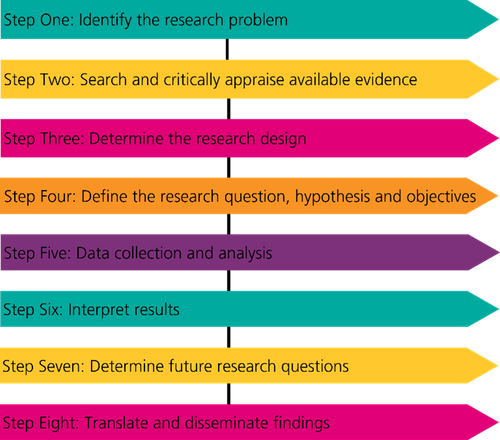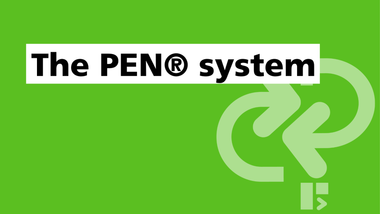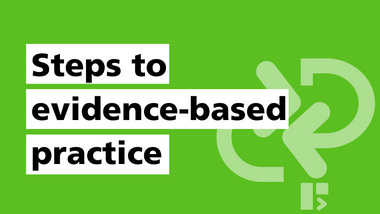Every member of the dietetic workforce, from the support workforce through to consultant level, has a part to play in supporting and conducting research. The level of involvement will vary according to your role, and your level of practice. The following information provides an overview of the key steps and principles you need to consider when conducting research.
Jump to:
| Deciding if its research | Governance and Ethics |
| Sources of funding | Research Process |
| Study Design | Useful Links |
Deciding if it is a research study
Is it a research study, a service evaluation or an audit?
Being clear on your project type will ensure you follow the correct protocols and processes; this is particularly important if you are undertaking a research study due to the associated research governance and ethics.
It can sometimes be difficult to determine what type of project you are undertaking. The following definitions provide a first step to support you to decide:
- Research study; this is designed and conducted to generate new knowledge
- Service evaluations: this is designed to answer the question “What standard does this service achieve?”.
- Audits: this is designed to find out whether the quality of a service meets a defined standard.
There are also a number of useful tools and resources available to support your decision making in this area. You can use the Project or Research Decision Tool to help you decide whether or not your study is research as defined by the UK Policy Framework for Health and Social Care Research. You can use the Defining Research Table, produced by the Research Ethics Service.
Research governance and ethics
If you have determined that your project is research, you will need to comply with all relevant research governance and ethics, and adhere to any local policies and procedures that are in place. It is worth thinking about ethical approval early in the research process, the forms and guidance available from the links below will help you to think through the steps of your project clearly. If your project is not classified as research, you must still behave in an ethical way and comply with policies and procedure that are relevant to your situation. Trusts and Health Boards will have audit/innovation/service improvement departments that you may need to register your project with.
Research governance sets out the rules, regulations and standards of conducting a research study. Whilst research ethics are the principles that guide your research design and practices. In combination, these ensure that your research is completed safely and effectively.
The governance and ethical considerations will vary according to the type of research you are undertaking. The majority of the dietetic workforce will be undertaking 'Health and Social Care' research, before you can start your research, you must first seek approval from the relevant bodies and health regulatory organisations. These may include, but are not limited to:
- The Health Research Authority (HRA) and Health and Care Research Wales (HCRW) Approval; they assess the governance and legal compliance of research within England and Wales.
- The NHS Research Scotland Permissions Coordinating Centre; they provide a coordinated and streamlined process for obtaining Scotland-wide NHS research and development permission for all multi and single centre NHS research studies.
- The HSC Research and Development Divison Northern Ireland; they provide guidance on seeking research and development permissions in Northern Ireland.
- The Research Ethics Committees (REC) ; these are independent groups of people who review certain types of research to assess whether studies are ethical.
- The Confidentiality Advisory Group (CAG); these provide advice on specific projects that will be using confidential medical information.
There are a number of other useful resources which could support to navigate research governance and ethics:
- The UK Policy Framework for Health and Social Care Research is the policy framework that sets out principles of good practice in the management and conduct of health and social care research in the UK.
- The Integrated Research Application System (IRAS) is a single system for applying for the permissions and approvals for health and social care research in the UK and helps ensure you meet regulatory and governance requirements.
- Ensure you are aware of the UK General Data Protection Regulations (GDPR) and the relevant Data Protection and information governance legislations.
Sources of funding
What will the project cost?
If you need funding for your research project it is important that you accurately assess your project costs, and seek funding in a timely fashion.
Putting together a Gantt chart of tasks will help you to estimate the time involved and highlight any other potential costs. For example, if you are involving the public and/or service users you may need to reimburse transport costs or offer vouchers to compensate for time. A Gantt chart will help you to understand if you have the time and skills to do all the tasks or if you will need input from other people.
Sources of funding could be external or internal, depending on the organisation you work for.
Internal
You should speak to your trust or organisation to determine if there is any available funding or grant opportunities that you could apply for.
External
There are a wide range of external funding opportunities available via organisations, research grants. We have listed useful resources to support with sourcing external funding:
The BDA General and Education Trust (GET) Research Grant
The GET Fund exists "to advance education and other charitable purposes related to the science of dietetics”.
The Trust can make grants to any individual or organisation engaged in dietetic research or related activities. You can find more information on the GET Research Grant and the application process here.
Association for Medical Research Charity
An easy way to look for UK charities is to use the Association for Medical Research charity member directory pages. These pages list over 150 charities that fund research.
Council for Allied Health Professions Research (CAHPR)
Your local Council for Allied Health Professions Research (CAHPR) hub is a useful resource for finding out about local funding opportunities.
National Institute for Health and Research (NIHR) Funding Opportunities
You can view all current NIHR funding opportunities on their webpage and use the available filters to find the opportunities most relevant to you. You can also find further information to help you fund your research, including eligibility and tips.
Steps to the research process
The research process follows a number of steps; however, this will vary according to the research approach taken. A simplified overview of the stages is outlined in the diagram below:

You can find more information about each of these steps, and the elements you need to consider on the PEN System, within the 'Research Methods' Knowledge Pathway, and you may also benefit from referring to the 'Steps to Evidence Based Practice' webpage.
Research design and methods
The study design/method you choose will be determined by your research question, research goals and the availability of resources. Your question may lend itself to a number of different designs/methodologies, and you may need to use a combination of these. Common study designs include, but are not limited to:
| Systematic review | Meta-analysis |
| Literature review | Rapid review |
| Scoping review | Randomised control trial |
| Cohort study | Case control study |
| Cross-sectional study | Case series |
| Narrative research | Ethnographic research |
Each study design has its own strengths and weaknesses which can affect the validity and applicability of findings. You can find more information about different types of design on the PEN System within the ‘Research Methods’ Knowledge Pathway. In addition to PEN, there are a range of useful resources available to support your with different study designs and methodologies including:
- Teeside University: Qualitative Research Methods
- NIHR: Quantitative Research Methods
- NHS England Bitesize Guide; Qualitative Research Methods
- The Preferred Reporting Items for Systematic reviews and Meta-Analyses (PRISMA)
- Cochrane Guidelines
- GRADE working group
- Cochrane guidance on completing a rapid review
- Joanna Briggs Institute
Useful Links
You can find more information and guidance on conducting research from the following internal and external links:




